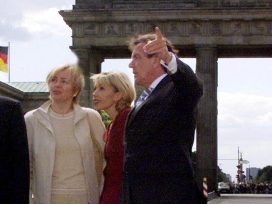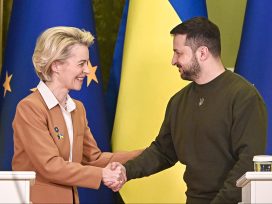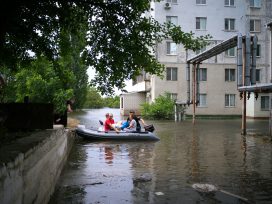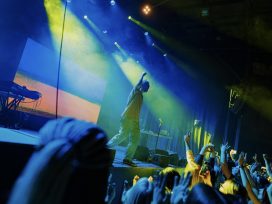1.
A few years ago, I found my image on the cover page of a popular Ukrainian weekly, among a motley group of Ukrainian writers and public intellectuals. The assemblage was to illustrate the main idea of the issue’s feature article, eloquently entitled “The masters of our defeats”.
I may have felt somewhat aggrandized by this, since my humble activity, even in cooperation or perhaps as a co-conspirator with a dozen other traitors, could hardly have resulted in the miserable situation that we now find ourselves in, after two decades of national independence. The origins of our woes certainly run deeper, and the masters of Ukrainian defeats are definitely more numerous than those clumsily Photoshopped on to the cover page in question.
Seasoned readers of the publication may have even recognized some of the featured individuals since the picture was based on the earlier atelier-style photograph from 1918 that depicted the leaders of the short-lived Ukrainian National Republic.
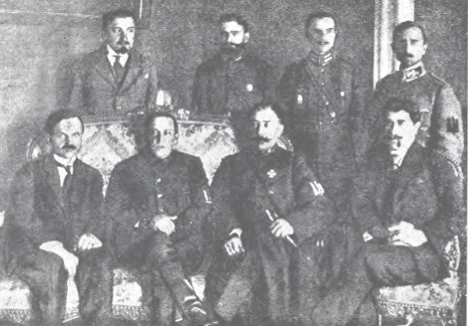
An original photograph of the government of the Ukrainian People’s Republic (UNR) in 1920, Symon Petlura in the centre. Source:Wikimedia
Their faces were replaced with ours – not very convincingly but perhaps this effect was intended – with the intention of drawing a parallel between the gullible, rotten and feckless liberals of the early twentieth century and those of today. All of them had allegedly wasted every available chance to build a strong nation-state and secure its independence. All of them were not just losers but stupid, ideologically perverse incompetents who inflicted defeat upon their nation, supposedly through preaching pacifism, tolerance and some moral principles in a world where might is right, the winner takes all, and the victors write the final version of history.
In a word, all of them were not merely liberals but liberasts – the term broadly applied by today’s Ukrainian far Right, alongside a similar coinage, “tolerasts”; both intended to denigrate their main ideological enemies.
2.
Back in 1980, an American scholar Alexander Motyl published a very perceptive book on inter-war Ukrainian nationalism – The Turn to the Right. It went almost unnoticed, since Ukraine was a non-entity at the time, virtually non-existent on most people’s mental maps. It was generally subsumed under the notion of Greater Russia, and therefore not a topic of any particular interest.
Motyl argued that the Ukrainian national movement, since its very inception, had been largely pro-European and democratic for the most obvious of reasons. A western orientation was the only feasible way for Ukrainian leaders to decouple their country from autocratic and mostly anti-European Russia; they had to counterbalance the symbolical power of the imperial centre with an even stronger power, that of an alternative centre located (or simply imagined) somewhere beyond Russia’s reach – in “Europe”. One might say that they were both westernizers and democrats by default; geopolitics simply did not provide them with any other option.
The situation, however, had changed after World War I for a number of reasons, leading to what Motyl aptly defined “the turn to the right”. First, with the spread of authoritarian tendencies and the consolidation of fascist and fascistoid regimes in a number of countries, liberal democracy in Europe went into retreat and certainly ceased to be the only game in town. Alternative – non-liberal political models of either a communist or fascist type – increasingly gained in popularity.
Secondly, the younger generation of Ukrainian nationalists projected all their resentments, caused by Ukraine’s dramatic defeat at the hands of Poles and Russians, upon their predecessors – the liberal and socialist leaders of the Ukrainian National Republic (UNR). In the view of the young radicals, the national liberation war was lost not only because of Russian and Polish preponderance, and not even because of a rather low level of national self-awareness among Ukrainian peasants, who were reluctant to fight for a national cause they poorly understood. The main reason of the UNR’s defeat, the young nationalists insisted, stemmed from the asinine liberalism of its leaders – their inability to act fast, tough and resolutely, and with little regard for legality and the human costs on either side of the battlefield. In a word, they failed to act as brutally and unscrupulously as their main rivals, the Bolsheviks.
The argument was not without rationale. An open, liberal democratic society is definitely more competitive in the long run than any closed, totalitarian dictatorship. Yet, in a relatively brief military encounter, totalitarian actors often win, since they are more easily mobilized, more determined and, therefore, far more prepared to overstep any written or unwritten rules in order to achieve their partisan goals. In Arsenal (1929), a classic film by Oleksandr Dovzhenko, there is a graphic episode where an old-style, bespectacled UNR officer tries to execute a Bolshevik saboteur, but apparently cannot shoot him face-to-face and demands that the Bolshevik turn to face the wall. The Bolshevik senses the officer’s feebleness and stubbornly refuses to turn his back. “Shoot me in the face!” he demands and, as his would-be executor continues to hesitate, the Bolshevik approaches him, takes the revolver from his hand and says scornfully: “So, you cannot? But I can!” – and kills his rival, without any remorse, hesitation or prejudice about the absolute value of human life.
1930s Europe had largely confirmed the weird efficiency of Bolshevik-style politics. Meanwhile, Ukrainian “integral nationalists” – like their British, French, Spanish and Dutch, to say nothing of their eastern European, counterparts – discovered a fascist ideology as a viable alternative to the both the communist threat and liberal decadence. Some of them shared a Nazi-style racism but, in most cases, they prized loyalty over blood in their definition of nation. Their nation was stateless and this meant they cared more about national independence than ethnic “purity”; they were ideologically rather than ethnically exclusive. As straightforward opportunists, they were ready to cooperate with whoever helped increase the chances of achieving national statehood. In the 1920s, many of them joined the Bolsheviks, who ostensibly pursued a policy of “indigenization” in the quasi-sovereign “Ukrainian Soviet Republic”. In the 1930s, as that policy ended in a bloodbath for the intelligentsia and the extermination of the peasants as a result of man-made famine, they turned their eyes to the West, looking for any ally who could be instrumental in implementing their dream of statehood.
Sadly enough, Germany was the only power willing and able to upset the post-war status quo and revise European borders. Western Ukrainians, pained by what they considered a Polish occupation, placed their bets on their enemy’s enemy – and lost twice. First, because the Germans were not interest in Ukrainian statehood, and even considered it as bogus as Slovakian or Croatian statehood. As soon as Ukrainians declared independent statehood in Lviv in June 1941, after the Soviet retreat, the Nazis arrested all their leaders, including Stepan Bandera, and packed them off to the concentration camp.
Secondly, to add an insult to the injury, the Nazi repression and executions of Bandera’s nationalists did not rescue the nationalists’ reputation. The Soviets became the victors, and their version of history was firmly established as received wisdom, if not scientific truth. Bandera nationalists who had fought, since 1941, both Soviets and Nazis, were intensely demonized as Nazi collaborators, bloodthirsty killers and war criminals (even though no international court had ever proved this to be so). The word “bandera” in Soviet newspeak became a metonym for all of these terrible things, and indicated the worst and ultimate form of a “Ukrainian bourgeois nationalist” – the label that the Soviets applied to all Ukrainians who strove to maintain some national self-awareness in defiance of official Russification (just like the term “Zionist”, with similar, semi-criminal connotations, was applied to anybody who maintained some conspicuous Jewish identity).
The word “nationalist” was discredited to such a degree that, even in independent Ukraine, only a few per cent of respondents to various nationwide polls were willing to identify themselves with a “nationalist” ideology or to vote for a candidate defining himself as a “nationalist”. By the same token, all the attempts of certain emigré groups to re-establish the pre-war Organization of Ukrainian Nationalists or any other formal successor to Bandera’s tradition of “integral nationalism” failed dismally in independent Ukraine. All these “new” old organizations remained strictly marginal and, according to various pieces of evidence, were manipulated less by overseas sponsors than by the Ukrainian and/or Russian security services.
On the other hand, two outstanding questions have yet to be answered. First, what is the relation between Bandera’s integral nationalist ideology, hardly very popular in contemporary Ukraine, and the relatively high popularity of Bandera’s partisan movement and of his personality too (at least in western Ukraine)? And, secondly, two decades after independence, why and how did a strong nationalistic party emerge in the form of “Svoboda” (“Freedom”) from the political margins to win, out of a blue, up to 40 per cent of the vote in a few regional councils in 2010 and an impressive 10 per cent in the 2012 parliamentary elections?
3.
The second question is probably easier to answer than the first, given the resonance today of the nationalistic resentment of the 1930s, these being a reaction to the failure of the Ukrainian national revolution that took place between 1917 and 1921 (and, partly, to the disastrous end of the “national revival”, supervised by the communists during the 1920s). In a way, events then and now confirm Walter Benjamin’s famous dictum that “every rise of Fascism bears witness to a failed revolution”. The far right Svoboda party advanced only after the liberal centre-right and centre-left parties completely discredited themselves, following internecine fighting and a frustrating failure to deliver on the ambitious promises of the spectacular – peaceful, liberal democratic and “pro-European” – Orange revolution.
In fact, the failed revolution gave rise not only to Svoboda, but also to old-fashioned totalitarian communists, who tripled their results (from 5 per cent in 2007 to 15 per cent in 2012) and to the formidable post-communist-cum-oligarchic “Party of Regions” – the mafia-style clientelist network that back in 2004 was reasonably considered a major threat to Ukraine’s sovereignty, democracy, rule of law and European integration. After its candidate, the notorious Viktor Yanukovych, won the 2010 presidential election, Svoboda became the last hope for quite a few Ukrainians, as the only tough guys able to withstand the pressure of the political gangsters who had captured the state and put it on sale.
This was the main but probably not the only reason for Svoboda’s success. Analysts point to the strangely broad presence of Svoboda in Ukrainian TV broadcasts produced under the auspices of president-friendly oligarchs and, more generally, the unusually generous financing of Svoboda’s electoral campaigns – highly suspicious for a party that had previously never achieved more than one per cent of vote. Experts suggest that the authorities and pro-government oligarchs supported “Svoboda” covertly with two goals in mind. First, they intended to weaken their main rivals – the liberal nationalists, by giving their regional strongholds to the radicals and by creating a scarecrow in the form of a “nationalist Taliban”, for both domestic and international consumption. And secondly, they may have planned to push Svoboda’s insipid leader into the second round of the 2015 presidential election, as the only candidate who they thought Yanukovych could easily beat.
Whatever the reasons, developments in 2014 clearly demonstrated that the scarecrow of Ukrainian “fascist” nationalism had been largely exaggerated – by both the Yanukovych regime, which pushed the story as part of an attempt at large-scale political manipulation, and by the Kremlin, which had persistently contributed to this mythmaking (on a systemic basis since 2005) and ultimately benefited from it during and especially after the Euromaidan – when Kremlin and pro-Kremlin media alike internationally trumpeted the revolutionary overthrow of Yanukovych’s kleptocracy as a “fascist coup”. Today, in the situation of an undeclared Russo-Ukrainian war, the use of this language, as Matthew Kupffer and Thomas de Waal aptly note, “casts the Russian-Ukrainian conflict as a replay of the ideological divide of World War II, with Russia and Ukraine branded as ‘antifascist’ and ‘profascist’ respectively. These labels are weapons in a rhetorical conflict that fuels the fighting on the ground. […] And these terms are the result of a nearly seventy-year process that has turned a concept into a politicized accusation with a general application”.
In a sharp contrast to that propagandistic rhetoric, the May 2014 presidential election in Ukraine brought candidates from “Svoboda” and “Right Sector” (another reportedly far right group) less than two per cent of vote and, in October of the same year, neither party managed to pass the five per cent threshold required to enter parliament. This signals not only the electorate’s disappointment in Svoboda’s MPs – often incompetent, arrogant and quite susceptible to corruption as they are. In contrast to “Svoboda”, the “Right Sector” was quite a new party, and presumably free of old vices. But their political reason d’etre had probably disappeared, in many people’s eyes, together with Yanukovych and his “Party of Regions” – broadly perceived as the nationalists’ political opponents and subjects that urgently required counter-balancing. In a situation of war, paradoxically, Ukrainians did not vote for the radicals but, overwhelmingly, for moderate centrists, tough enough vis-a-vis Russian aggression but reconciliatory vis-a-vis domestic divides and possible contradictions.
4.
Having answered the second question – about the most likely reasons for the radicals’ rise and decline – we can turn back to the first one, and consider the paradoxical popularity of the nationalist leaders, of their movements and symbols, in an apparently non-nationalistic country. A major debate on the topic occurred in 2010, shortly after Viktor Yushchenko, fresh from defeat in the presidential elections, made a dubious farewell gesture: he decorated Stepan Bandera posthumously with the highest national award, as a Hero of Ukraine.
The move provoked a sharp response from Moscow, which for years had depicted Viktor Yushchenko and his government as Bandera-style “fascists”. It was dismissed also by Viktor Yanukovych and his “Party of Regions”, who closely cooperated with Moscow in their “anti-fascist” campaign and actually relied on the same spin-doctors. Yet, an unexpected blow came also from European quarters, where the Poles, Yushchenko’s long-time allies, initiated a resolution in the European Parliament that “deeply deplored” his decision and called upon the new Ukrainian leadership (i.e., president-elect Viktor Yanukovych) to reconsider the unfortunate gesture, for the sake of Ukraine’s commitment to European values.
One may smile acerbically at the naivety of calling upon Viktor Yanukovych to become a guardian of “European values”, yet much more confusing was the clause concerning Bandera’s “collaboration with Nazi Germany”. The phrase probably referred to the pre-1941, i.e., pre-Sachsenhausen period, when Bandera’s clandestine Organization of Ukrainian Nationalists (OUN) looked for support for their cause in various European corners. If taken synchronically, his “collaboration with Nazi Germany” did not differ essentially from that of most European leaders of the time, who not only negotiated but also signed quite a few dubious agreements with Hitler, including the seminal 1939 agreement on “eternal peace and friendship” between Germany and the Soviet Union.
Hardly any of the members of the European parliament had ever heard about Bandera and all that. They fully relied on the Poles, and the Poles had quite a good reason to see Bandera more or less the same way the Israelis saw Yasser Arafat – since Polish-Ukrainian relations in western Ukraine after World War I had largely resembled Jewish-Arab relations in Palestine after World War II.
The Ukrainian intellectuals, to their credit, were rather unanimous in their condemnation of Yushchenko’s move as an irresponsible political provocation that played primarily into Moscow’s hands, but they were also critical of the European MEPs for their imprecise phrasing and even more so for their playing into the same hands by treating highly complex issues without due factual and contextual knowledge. The main discord between European and Ukrainian intellectuals was not about the “text” but about the context; not about the essence of Bandera’s deplorable and out-dated ideology, but about the anti-colonial, national-liberation character of his movement – which is still topical and significant for many Ukrainians.
Remarkably, it is not the OUN terrorist activity against the pre-war Polish government that is glorified today in Ukraine, but first and foremost the post-war anti-Soviet resistance of the OUN-based Ukrainian Partisan Army (UPA). Alexander Motyl has outlined this very well:
Contemporary Ukrainians who regard Bandera as a hero lionize his and his movement’s implacable opposition to the Soviet Union in 1939-1955. No one regards the nationalists’ violence against Poles and Jews as laudable, but few regard it as central to what Bandera and the nationalists represent: a rejection of all things Soviet, a repudiation of anti-Ukrainian slurs, and unconditional devotion to Ukrainian independence. Bandera and the nationalists are also seen as the polar opposites of the corrupt, incompetent, and venal Ukrainian elites who have misruled Ukraine for the last twenty years. Of course, this popular reading of Ukrainian history is one-sided, and a full account would entail both the good and the bad things Bandera and the nationalists did. But one-sided historical readings are not unusual, especially among insecure nations struggling to retain their new-found independence.
The last point is particularly important. It implies that Ukraine was not just a “normal” nation, with a firm identity and secure statehood, that had to choose between authoritarianism and democracy, i.e., between the crypto-fascist ideology of the OUN and the liberal-democratic values of today’s European Union. The reality was quite different, as the real choice at the time was not between evil and good but between various kinds of evil. Therefore, it is not the political/ideological aspect of Bandera’s legacy that makes it relevant nowadays but, rather, the ethical aspect, however idealized: that of patriotism, national solidarity, self-sacrifice and idealistic commitment to common goals and values.
This is exactly the aspect of Bandera’s and the OUN/UPA’s legacy that was primarily targeted by the Soviets, as Alexander Motyl observes: “Soviet propaganda always demonized the nationalists, not for their violations of human rights – after all, who were the Soviets to care about human rights after inventing the Gulag? – but because of their opposition to Stalinist rule […] The post-war nationalist resistance movement enjoyed vast support among the Ukrainian population of western Ukraine precisely because it stood for opposition to Stalinism and symbolized the cause of national liberation. […] Soviet demonization of the nationalists promoted and created a deeply rooted image of them as savage cutthroats with no political or ideological agenda except for death and destruction. This image took root in, above all, the heavily Sovietized parts of eastern and southern Ukraine, which had served as strongholds of Communist Party rule. Russians and Russian speakers picked up on official cues and frequently insulted nationally conscious Ukrainians who dared to speak their own language by referring to them as ‘Banderas’. […] What Russian chauvinists had used as a term of opprobrium – Bandera – became a term of praise, much in the way that African Americans appropriated the ‘N-word’.”
5.
The story took a new and unexpected twist during the Euromaidan, when the odd term “Judeo-Banderites” was coined in the context of Russian propaganda, after its failed attempts to depict the Maidan as a bunch of unruly pogromchiks and rabid anti-Semites. But the new attempt at slander failed too, largely because of the firm position that the Ukrainian Jewish community took, on the side of protesters, thus dismissing the calumny in both word and deed. So, yet another myth was invented – about a conspiracy between the Ukrainian “fascists” and Jewish oligarchs, with the term “Banderites” used for the former and “Judeo-Banderites” for the latter.
These terms were not, however, rejected but rather appropriated in a humorous way – with the famous public appearance of a Jewish-Ukrainian oligarch Igor Kolomoisky on a T-shirt with the sign “Zhydo-banderovets” (Judeo-Banderite) and the Ukrainian coat of arms (a trident) styled as menorah.
The prominent Jewish-Ukrainian artist Alexander Roytburd, who came from Odessa during the first days of the Maidan to take part in the protests, explained his feelings about the alleged “anti-Semitism” of the Maidan in a similarly humorous way:
I’m often asked about my peculiar Jewish feeling as regards Maidan. I have no peculiar Jewish feeling about it. Sure, I feel myself a Jew on the Maidan – exactly as I feel myself a Jew on a Hawaiian beach, in Red Square, or in the Metropolitan Museum. But I do not feel particularly endangered there due to my Jewishness. Some professional Jews tried to launch a campaign in the international media about “Maidan’s anti-Semitism”. My insider’s opinion: there is no anti-Semitism there. Sure, there are some anti-Semites. But they are everywhere, including on the Hawaiian beach, in Red Square or the Metropolitan Museum… They are also in the Philharmonic at the performance of Rachmaninoff’s Third Piano Concerto. Yet, they do not come there to beat the Jewish violinists but just to listen to the music.
The observation, humorous as it may be, touches upon a serious problem: to what extent and for how long can the liberal democratic community peacefully co-exist and even co-operate with the profoundly illiberal or even anti-liberal groups of either a far Right or far Left leaning? The common enemy – like the army mounting a foreign invasion or a domestic dictatorship – will probably indulge in such a cooperation, at least on a limited basis, as many Resistance movements in a Europe under Nazi occupation quickly discovered previously.
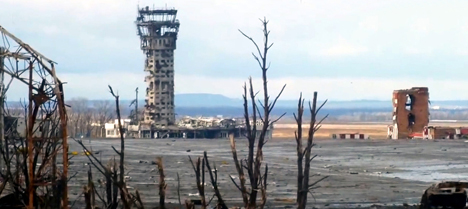
Donetsk Sergei Prokofiev International Airport, 24 December 2014. Photo: Pravda DPR. Source:Wikimedia
The Maidan was a frontline last winter, more or less as Donbas is today. In both cases, among the possible responses to the advance of alien “fascists”, it makes little sense to look for the “fascists” within one’s own ranks. Especially when the alien “fascists” are much more numerous, better armed and firmly institutionalized within a centuries-long tradition of state-sponsored chauvinism, jingoism and aggressive imperialism. For twenty years, we have laughed at political clowns like Vladimir Zhirinovsky – until his ludicrous statements became a reality under Putin. For twenty years we have treated some Russian intellectuals as harmless mavericks – until we discovered that they simply articulate Putin’s subconsciousness.
Today, we can scarcely laugh when reading a statement by Alexander Dugin, a fascist philosopher and long-time professor at Moscow State University, who offers a radical proposal for resolving the pending Russo-Ukrainian conflict: “We should cleanse Ukraine of idiots. A genocide of the cretins is due and inevitable… I can’t believe these are Ukrainians. Ukrainians are wonderful Slavonic people. And this is a race of bastards that emerged from the sewers.”
As long as we do not match Dugin’s (or Putin’s) notion of Ukrainians as “wonderful Slavonic people”, we can be cleansed from the Earth – regardless of whether we are liberals or conservatives, far right or far left – just because we all represent the wrong type of Ukrainians, distinct from those that the Russian imperial imagination had created within the past three centuries.
The banal and very sad truth is that, under sniper fire or rocket shelling, the political views of the fighters are nearly as irrelevant as their artistic tastes or sexual orientation. But at a given time and place, they should definitely be encountered – as has already happened, albeit for a short time, during last year’s presidential and parliamentary elections.
As an incurable “liberast” I believe we will have such an opportunity – once again and this time for longer – to discuss the masters of our victories and of our defeats in a more academic, as opposed to militant, manner.





